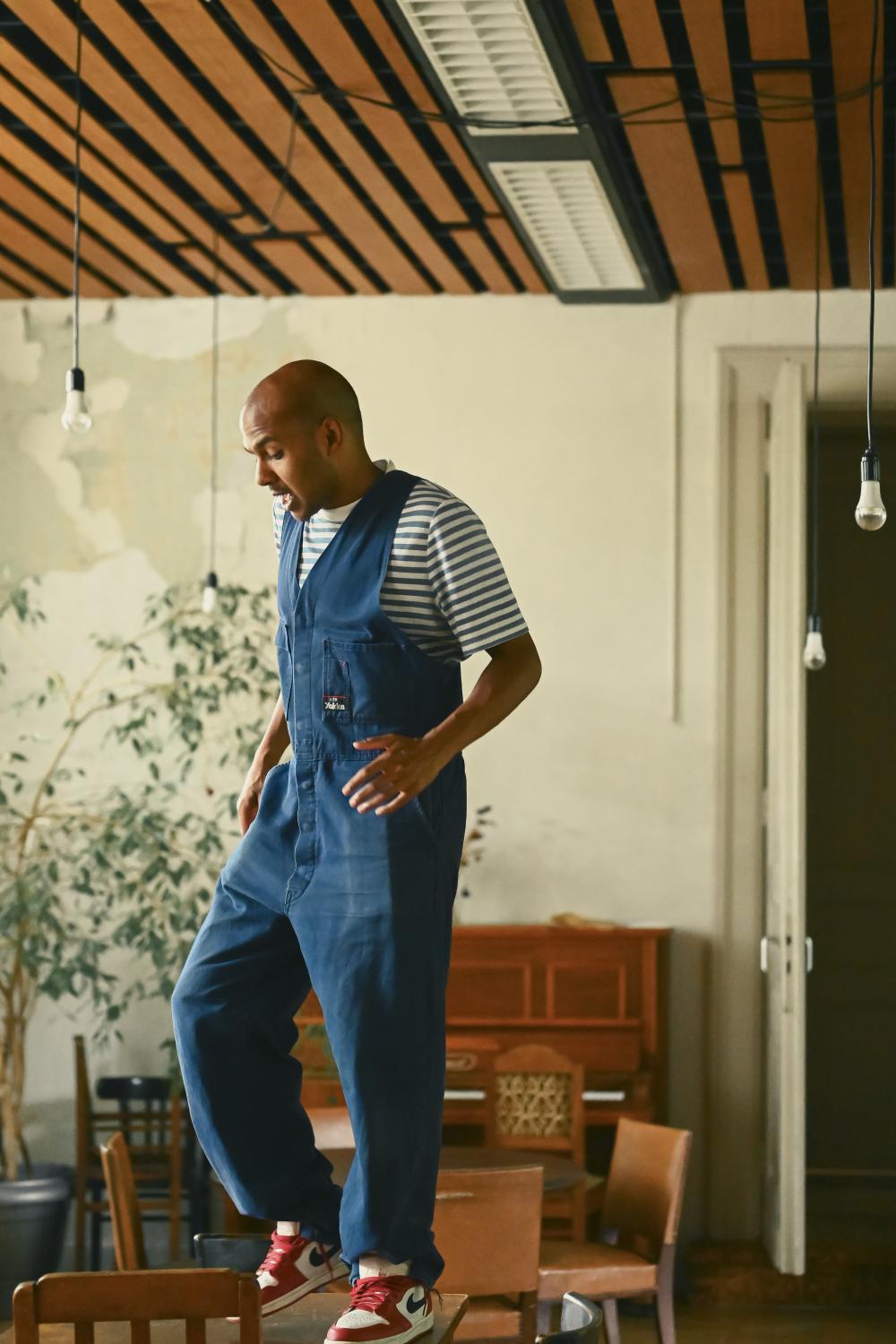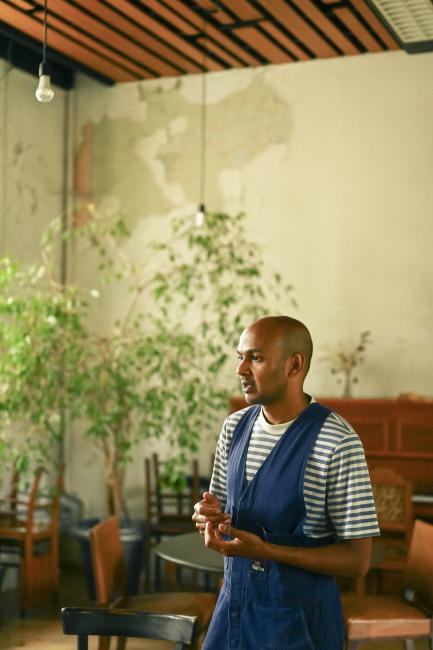"HOW CAN A GAME BE SO INCREDIBLY IMPORTANT?"
Residentengesprek met Ahilan Ratnamohan
interview with Ahilan Ratnamohan by Eva Decaesstecker (Kaaitheater, May 2023)
There are some moments that are life-changing and so intense that you immediately know that things will never be like they were again. But often, you only realise long after how key they were. In this interview, theatre-maker and choreographer Ahilan Ratnamohan guides us along the road he has travelled so far. From film to theatre. From football to dance. From Australia to Belgium. From English to Tamil. We met up with in early March, in between rehearsals of various projects.
Ahilan Ratnamohan, born in Australia of Sri Lankan parents, first graduated from film school in Sydney and considered a football career, before stepping onto the stage. Now a theatre maker, he creates interdisciplinary pieces with unconventional performers and forms.
Like any life, his is made up of experiences and choices. What many of these moments have in common is that they set something in motion that at the time could not be seen. They are eye-openers, planted seeds that will determine Ratnamohan's path indirectly.
The tipping point in his view of cinema, for example, came with Darren Aronofsky's Requiem for a Dream. The first revelation within performing arts was a theatre performance by Carlos Gomez. A key transition from performer to director was during his time with the Branch Nebula company.
Sometimes, these points in retrospect turn out to be multi-layered. Before plunging into the world of theatre, he tried to carve out a career as a professional footballer. Including in Germany, where he happened to attend a rehearsal of the dance ensemble at Theater Ulm and, bitten by dance, there and then decided to take ballet lessons. "As I tell this story, I realise that this key moment is not only about movement but also about language. Because after that rehearsal, we all went for something to eat. As a monolingual English-speaker, I was hugely impressed by how those dancers, who had travelled the world, switched between Italian, German, English."
Making his show Michael Essien I want to play as you, was also a first for a lot of things: his first show in Belgium, his first show as a director, a first time working with an ensemble of footballers. "I also learnt then that working with non-professionals is not the same as working with non-performers. In fact, their training culture meant that those footballers were very professional." Another key moment can later at the Latvian festival Homo Novus, where he made a performance in Latvian against all odds.
Language, alongside football, is one of the common threads throughout your work. When did language become a subject for you to create performances around?
AHILAN RATNAMOHAN: Another tipping point I had forgotten! In 2010, in Australia, having just returned from Germany, I tried something with language for the first time. I still lived with the feeling of becoming a small child whenever I spoke poor German in Germany. Feeling stupid. I embarked on a performance around the power of language at Campbelltown Arts Centre. After a few weeks of working around paraphrasing and translation with a group of foreign-language artists, Anne-Marie Dalziely, Campbelltown's producer, came up to me and said: "I'm sorry, but I think you're on the wrong track, " she said. "I'm not sure but I would like you to try something else for a while. I want you to start running workshops in a class using the material from your rehearsals." The games I had developed in rehearsals were vaguely based on using language incorrectly. I then in fact started teaching workshops to a class full of newcomers taking English classes. This was important to those students because the workshops finally allowed them to make mistakes. That is also my philosophy when learning a language: don't be afraid to make mistakes. I ended up presenting The Foreigner with the students – a sort of game where they guided a largely English-speaking audience. At that point, it was not a finished performance but on the one hand it confirmed the power of working with non-performers, and many of the tactics we used I have continued to explore over the past few years.
After that, I did not do much with the language aspect in my performances for a long time. It was only in 2017 – by then, I had been living in Antwerp for almost five years – that I pitched The Foreigner for the Homo Novus festival. My collaboration with the festival then evolved into a trilogy, The Foreigner, Billē in 24 hours and The Perfect Migrant, a monologue in Latvian. The experience of that monologue was a crucial moment for me. I saw how exponentially my Latvian had improved by memorising a Latvian script and realised the potential of performance to learn a language. Learning a language also gives you connection and access to certain emotions of a population. At the same time, while making the show, I was confronted with the amount of space I give each language in my life. I realised how little room I could make for Tamil, my parents' language that I myself was never taught (I was brought up in English in Australia because my parents believed it would increase my chances later).
So how do you move among all these languages? Especially between your mother tongue, English, your parents' language, Tamil, and all those other languages you learnt along the way.
A.R.: I learn languages according to the context I am in. Some languages come more easily than others. German, which I learnt while training in Germany, has really become an asset. I have been using my German with German and Swiss programmers for years. In recet years, French has also been very present and now especially with my French-language performance Une traduction infidèle.
Tamil is something I rarely come across if I don't actively seek it out. A few years ago, I started travelling regularly to the village in Sri Lanka where my parents are originally from. But Covid and the economic crisis, as well as my own busy schedule, have made the frequency of my Sri Lanka trips too unpredictable. So I had to find ways to incorporate Tamil into my life here in Antwerp. This has to some extent succeeded but not yet completely, which is what I talk about in the lecture-performance series Should have been my mother tongue.
When I start studying other languages, I feel a bit guilty towards Tamil. I always learn two languages at the same time and the choice of language is often based on the projects I do. Right now, that is French and Tamil. I recently decided for myself that Tamil should always be one of the two languages – something that in the past often was not the case. I now also speak Tamil consistently with some of my relatives and friends.
Besides language, football was also one of the big topics in your work, as you also mentioned earlier. In recent years, this theme seems to have taken a bit more of a back seat.
A.R.: Football has been absent from my work for several years, which I really regret. I feel that multilingualism has more resonance in Belgium, and also my own endless interest in language has meant that the focus is mainly there these days.
At the same time, everything around football-dance-theatre and Klapping (my football-inspired urban dance language) is still a great passion. A few weeks ago, by the way, things started to move again. Next year, the European Football Championship takes place in Germany and there are many opportunities to do things. It looks like 2024 will be the year of the return to my footballing roots! (Laughs)
I still have a lot to explore within football. Last year, I also started coaching my daughter's football team. What I learn most of all there is how much I love football. Sometimes, I find it difficult to admit that in the arts world. My passion for football runs incredibly deep.. It fascinates me that a game can become so incredibly important that you can be constantly engaged with it. It sometimes seems like it embodies something else or appeals to something bigger.
Language and football also sometimes come together in your work. This was the case with Look On The Bright Side, in which Nigerian footballer Etuwe Bright Junior talks about his dream of becoming a (football) star in Dutch. Now, there is a sequel: Josse Jnr, together with Josse De Pauw.
A.R.: When I initially spoke to Josse about this project, I in particular wanted him to work with Junior. I myself did not necessarily want to be involved in the project because that seemed the best for Junior. But when Josse heard the story behind the show, he thought the three of us should make it together.
Junior and I had made Look On The Bright Side with the aim of making Junior a star. To some extent, that succeeded but to some extent it failed too. That show happened to feature a text by Josse and we referred to it as the concept of theatre stars in Belgium like Josse or Bruno Van den Broecke. For me, it was very clear that collaborating with a star like that was the next step in the evolution. Especially hearing Junior learn and perform one of Josse’s texts had touched me so deeply on several levels. I wanted to explore this further. In terms of content, the cooperation is interesting but it is also great for Junior on a professional level.
Before you première Josser Jnr., you will put on Une traduction infidèle, during Kunstenfestivaldesarts. A show that you will learn French for and examine French-speaking Belgium (and its absence in Flanders). How do you tackle this theme?
A.R.: I go about my work as a Gonzo Journalist: I approach the subject in a very personal way. On the one hand, I put a huge focus on learning the language. I also take short trips. For example, I spent a few days on a farm in Œudeghien working and learning French and soaking up their culture. I also visited Binche during the Gilles de Binche carnival. I also arranged a last minute colocation and residency in Liège. This morning I spoke to students of French - and I have also been wondering whether I should perhaps enrol in a French course to have that experience too.
Le Maillot - One Size Fits All, a project I made with Globe Aroma last year, was another breeding ground. The group we were working with was predominantly French-speaking, but the were huge differences in accents: from Burkina Faso, from Flanders, from Liège but originally from Congo, from Brussels, from Guinea... Very confusing because the pronunciation is often so different, but I just wanted to speak French with the group - no matter how bad my French was. The material of Une traduciton infidèle is still fairly thin. We'll see where we end up!

